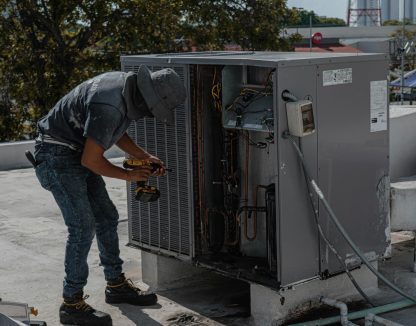Successfully operating an HVAC (Heating, Ventilation, and Air Conditioning) business involves more than just providing top-notch heating and cooling systems services. It also requires effective financial management. Understanding HVAC accounting is essential for the growth and longevity of your HVAC company. Proper financial management is crucial to ensuring your operations run smoothly and efficiently. It enables you to make informed decisions and drive the long-term success of your HVAC enterprise.
What is HVAC accounting?
HVAC accounting is a specialized branch of accounting that focuses on the financial management of heating, ventilation, and air conditioning businesses. It involves tracking income and expenses, managing cash flow, handling future inventory costs, and ensuring that all financial aspects of an HVAC company are in order. Accurate accounting is essential for making informed business decisions and maintaining the financial health of an HVAC business.
Here are ten essential HVAC accounting tips to help you navigate the financial aspects of your field service business:
1. Utilize Specialized Accounting Software
Investing in specialized accounting software tailored for small businesses is your first step to effective financial management in your HVAC business. This software, such as QuickBooks, lets you maintain precise records, accurately track income and expenses, and streamline financial reporting. With the right software, you can easily generate crucial financial statements such as profit and loss statements and balance sheets. This streamlining not only saves time but also ensures that your financial data is accurate and up-to-date. It allows you to make informed financial decisions, and it’s particularly valuable in a field where managing costs and cash flow is vital.
2. Regular Financial Reporting
Consistent financial reporting is a cornerstone of maintaining the financial health of your HVAC business. By generating income statements and balance sheets regularly, you gain valuable insights into your business’s profitability and asset management. Your balance sheet can show you if you have enough cash and short-term assets to cover expenses if you have a positive net worth and more. These reports offer a snapshot of your financial position, indispensable for making informed decisions. Regular financial reporting not only helps you understand the current state of your business but also aids in setting long-term financial goals and strategies. One way to streamline financing reporting is by using accounting software such as QuickBooks. And, with the QuickBooks and Payzerware integration, all job payments and invoices are captured and reported back into QuickBooks seamlessly so your reporting is accurate, and up to date.
Ready to Learn More?
3. Cash Flow Projections
In the HVAC industry, cash flow is the lifeblood of your business. Creating cash flow projections allows you to anticipate both surpluses and deficits in your cash flow. This forward-looking approach empowers you to plan for upcoming expenses, such as equipment maintenance or upgrades and ensures that the necessary funds are available when needed.
Given the seasonal variations in demand for HVAC services, accurate cash flow projections are crucial for managing the ebb and flow of your business’s cash position and allow you to adapt and make financial decisions that align with your business’s unique economic patterns. Here are a few steps to calculate a simple cash flow forecast.
- Decide how far out you want to project
Cash flow planning can cover anything from weeks to months so think about how far ahead you want to look. This can change over time, so don’t stress about this too much. If you’re well established, you likely have more historical data and a larger sales pipeline to help with the forecasting. If you’re completely unsure, start with something simple such as 6 months.
- List all of your income
For each week or month in your cash flow forecast, list all the cash you’ve got coming in. Have one column for each week or month and one row for each type of income.
Start with your sales, adding them to the appropriate week or month. You might be able to predict this from previous years’ figures if you have them. Remember though, this is about when the cash is actually in your bank account. Put the figures in for when you know clients will pay invoices, or bank payments will clear.
Also remember to include all non-sales income, for example:
- Tax refunds
- Grants
- Investment from shareholders or owners
- Royalties or license fees
- Add up the total for each column to get your net income.
3. List all of your expenses
Now, let’s look at all of your expenses.
- Rent
- Salaries
- Raw material
- Assets
- Bank loans and fees
- Marketing and advertising spend
- Tax bills
4. Find your running cash flow
For each month column, take away your net expenses from your net income. That will give you either a positive cash flow figure (you’ve got more cash coming in than you’re spending) or a negative cash flow figure (you’re spending more than you’ve got coming in).
You can then keep a running total, from week to week, or month to month, to get a picture of your cash flow forecast over time. Too many negative weeks in a row might spell trouble, and you’ll need to do some planning to make sure you can meet your upcoming commitments such as payroll or rent. Equally, a few positive months might alert you that you’ve got money to expand or invest in new areas of the business.
4. Improve Accounts Receivable
Maintaining a healthy cash flow often hinges on your ability to collect payments from customers promptly. Improving your accounts receivable by monitoring outstanding invoices and payments ensures your business has a steady cash flow. This is a key financial management practice for HVAC companies, as it helps you maintain consistent operations, pay expenses on time, and take advantage of growth opportunities. Better than estimating the accounts receivable is improving it. With software like Payzerware, you have multiple ways for your customers to pay you – infield with mobile card readers, ACH options for recurring payments, and invoice links that you can text or email the customer.
5. Manage Expensive Equipment
HVAC companies rely heavily on expensive equipment and properly accounting for these assets is vital for accurate financial reporting. Beyond basic depreciation, it’s essential to track maintenance costs and plan for replacements or upgrades. Effective asset management not only ensures that your financial statements accurately reflect your business’s position but also helps you budget for equipment expenses, preventing financial surprises and disruptions to your operations. There are a few key things HVAC business owners can do to help manage their equipment and ensure you don’t lose money on it:
Focus on Routine Maintenance
Failing to perform routine maintenance on HVAC equipment can lead to inefficiency, increased energy costs, and higher chances of equipment failure. Implement a proactive maintenance schedule to ensure all equipment is regularly inspected, cleaned, and serviced.
Invest in Staff Training:
Invest in ongoing training programs for HVAC technicians to keep them updated on the latest technologies and best practices. Insufficiently trained technicians may lead to incorrect installations, poor repairs, and decreased overall system performance.
Pay Attention to Indoor Air Quality (IAQ):
Focusing solely on temperature control and neglecting indoor air quality can lead to health issues for building occupants. Offer IAQ assessments and recommend appropriate solutions such as air purifiers, ventilation systems, and humidity control.
Proper System Sizing:
Incorrectly sizing HVAC systems can result in inefficient performance and increased energy consumption. Conduct thorough load calculations to determine the correct size of equipment needed for a particular space.
Insurance
HVAC companies typically carry a combination of general liability insurance, workers’ compensation insurance, and possibly professional liability insurance. These insurances help protect the company, its employees, and clients in case of accidents, property damage, or errors in services.
It’s crucial to consult with an insurance professional to tailor coverage to the specific needs of your HVAC business. Policies may vary based on factors such as the size of the company, types of services offered, and local regulations. Always ensure compliance with local and industry-specific requirements when selecting insurance coverage for an HVAC business.
6. Prepare for Tax Season
Tax season can be a stressful time for any business owner, but proactive preparation can ease the process and potentially save you money. Maintain organized records of all your business expenses, income, and potential deductions throughout the year. By doing so, you ensure that tax filing is a smoother, more efficient process. Proper record-keeping also allows you to take full advantage of available HVAC tax deductions and credits, helping to reduce your tax liability and improving your overall financial position. Common HVAC tax deductions and write-offs include HVAC equipment and tools, vehicle expenses and mileage, rent and utilities, and consumable supplies such as sealants and ducts.
7. Efficient Inventory Management
Efficient inventory management practices can significantly impact your HVAC business’s cash flow. By avoiding the tie-up of excess funds in unsold HVAC equipment and supplies, you keep your working capital readily available for other essential business needs. Implement lean inventory practices, by identifying and eliminating waste of materials, effort, and time, and optimize your supply chain processes to minimize carrying costs and prevent stockouts, ensuring that you have the right parts and equipment on hand when needed.
Using HVAC software that helps you populate and view reports on items sold each day is one step towards managing your inventory. You can simply view all items sold that day, and restock each truck before the following day’s jobs. That way, each truck is ready to go. There are also sophisticated inventory management systems available depending on the size of your business.
8. Use HVAC Management Software
Implementing field service management software, like Payzerware, streamlines your HVAC business operations, enhancing overall efficiency and customer satisfaction. These tools help you efficiently schedule jobs, track expenses, and manage invoices. Integration with your accounting system ensures a seamless flow of financial information, reducing the risk of errors and streamlining the financial aspects of your business.
9. Plan for Future Expenses
Anticipating future expenses is essential for HVAC businesses, as maintenance and occasional equipment upgrades are inevitable. These anticipated costs should be included in your cash flow projections to ensure that you have the necessary funds available when needed. By proactively planning for these expenses, you minimize the financial impact, maintain cash flow stability, and ensure that your business can continue to provide quality services without interruption. This approach supports long-term financial health and stability in the HVAC industry.
Accounting is a critical aspect of running a successful HVAC business. By implementing these HVAC accounting tips, business owners can ensure their finances are well-managed and better positioned to achieve growth and profitability. With the right tools and strategies, you can keep your HVAC business running smoothly and continue to provide excellent heating and cooling system services to your customers.
How HVAC Business Software Can Help With Accounting
Partnering with Payzer can be a wise decision for your HVAC business, as it offers a comprehensive financial solution tailored to the specific needs of service-based industries like yours. Payzer’s platform combines financial tools, payment processing, and field service management capabilities in one integrated system. This integration streamlines and simplifies many aspects of your business operations.
With Payzerware, you can manage everything from accounting and invoicing to scheduling and inventory control in one place, making it easier to stay organized and make informed financial decisions. Additionally, Payzer provides advanced features for estimating, proposal generation, and financing options, allowing you to offer flexible payment solutions to your customers, ultimately boosting your sales and revenue.
By partnering with Payzer, you can enhance your business’s financial management, improve customer service, and drive growth, all while reducing the administrative burdens that often come with managing an HVAC company. Click here to schedule a demo!
Frequently Asked Questions
Is QuickBooks good for an HVAC company?
QuickBooks is a popular accounting software that can be a good fit for many small businesses, including HVAC companies. It offers features for managing income and expenses, generating financial statements, and even handling payroll. However, the suitability of QuickBooks depends on the specific needs and size of your HVAC business. Payzerware offers a seamless QuickBooks integration, allowing you to eliminate double entry. Customers, sub-customers, invoices, chart of accounts, and more are synced from QuickBooks and loaded into Payzerware for you so your company is ready to start using the system fully upon making the switch.
How profitable is an HVAC business?
The profitability of an HVAC business can vary significantly depending on various factors, including location, market demand, competition, and the business’s efficiency and management. Many HVAC businesses can be quite profitable due to the ongoing demand for heating, ventilation, and air conditioning services, as well as the potential for recurring revenue from maintenance contracts. However, it’s essential to manage expenses, maintain a steady stream of customers, and provide high-quality services to maximize profitability. Consulting with an accountant or financial advisor can help you assess the specific economic potential of your HVAC business.







